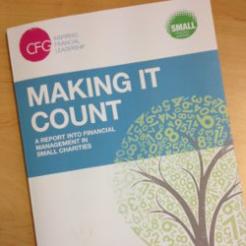There is a lack of financial capability on small charity trustee boards with many organisations leaving ‘the finances’ to one individual, according to a report by the Charity Finance Group and the Small Charities Coalition launched today.
The Making it Count report into financial management in small charities advises that finance should not be the responsibility of one board member but should be embraced by all small charity trustees, as all trustees are liable.
But, it adds, small charities face many barriers to understanding finance, not least of which is an unwillingness or inability to undergo financial training. Small charities often lack the financial means to pay for courses, the authors advise. While research undertaken for the publication found that small charities would be willing to pay £40 to £60 on average for a one day course, this is “considerably less than many courses currently available”. Furthermore, many small charity employees or volunteers are unwilling to leave their everyday work for a day due to limited resources.
Another concern is that many people working in small charities do not know what they should know. A lack of signposting of important information and requirements was highlighted: “…if a small charity has no idea that it is entitled to a VAT exemption on printed materials then it will not seek out guidance about how to claim this…More worryingly, an organisation may not realise that important financial controls are lacking until it is too late, with potentially serious implications for the security of the charity’s funds,” the report warns.
The report also suggests the need for one comprehensive source of information on charity finance, saying that while there is a plethora of information available to small charities, it is spread across too many websites, with some offering conflicting information. This lack of definitive information can lead to excessive amounts of time spent on financial management, or confusion over which rules apply to them.
Making it Count advises that “At a time when resources are stretched, good financial management is arguably more important than ever, for insuring legal compliance, attracting funding, and above all, maximising a charity’s impact and sustainability.” It urges those organisations in a position to offer financial guidance and support to do so and to make their support visible.

| Want access to all civilsociety.co.uk content?Subscribers gain access to all expert advice, analysis, surveys, special reports and the full archive of content from as little as £43.20 per year. Find out more... |








